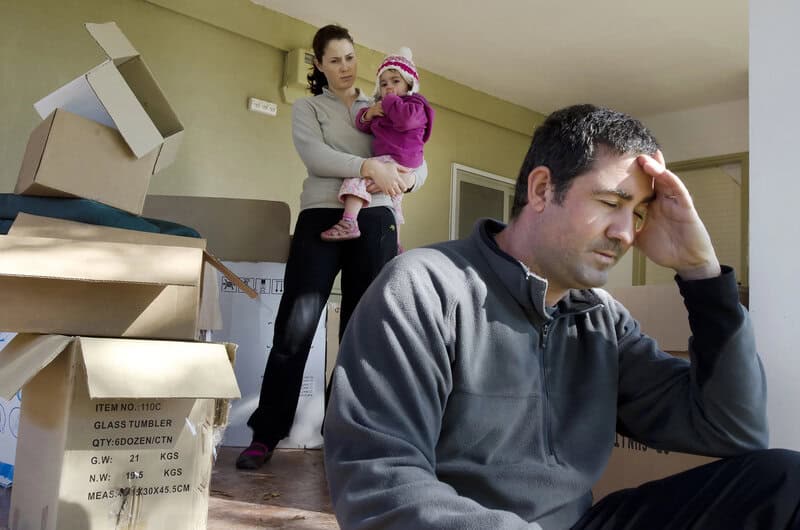 There are many reasons couples may choose – or need – to live together during a divorce. Sharing the next during a divorce requires clear communication, boundaries, and agreements – especially if children are in the mix.
There are many reasons couples may choose – or need – to live together during a divorce. Sharing the next during a divorce requires clear communication, boundaries, and agreements – especially if children are in the mix.
How To Live Together During A Divorce
Most of the time, cohabitation during a divorce is part-time as either or both parties find another place to live, which isn’t always a fast process. For example, many couples in the Bay Area often find that living together throughout the divorce is the only way they can afford to do things until the divorce is final.
Whatever the reason, it can be a challenging situation, and after 40+ years of working in family law and mediation, I’ve learned some professional tips on how to share a living space while getting a divorce.
Work with a professional counselor or therapist
In this situation, it’s a good idea to work with a licensed counselor or therapist who can help each of you process, handle, and navigate the tension, challenges, and complicated emotions that can arise while living in the same house with a person you’re getting divorced from.
The ability to diffuse your emotional energy and learn valuable tools for working through this period will continue serving you well throughout your life, especially if you’re co-parenting together.
Create a specific budget
Once a divorce is finalized, you’ll have a list of things you must do to meet all of the divorce agreements. One of the first and most important is separating your finances. If you will be living together throughout the divorce process – or for a short time thereafter – this is a good time to begin dividing those things (assuming you agree).
Remember that California is a community property state; outside of possessions or assets that belonged to you before the marriage or inheritances received during the marriage, this means that all of the financial assets acquired throughout the marriage are split 50/50.
Once you each have your own checking accounts, close joint credit accounts, and start individual credit card accounts, create a budget reflecting the new reality. Remember that cohabitation at this point is a business arrangement, so it can be helpful to think of each other as housemates and handle the household bills accordingly.
Consider getting legally separated
We mentioned above that California is a community property state. So, unless you’re legally separated, everything is still split 50/50 until the divorce is final, and that includes debt. While you can close a joint checking account and open individual accounts that your spouse can’t access without legal intervention, any credit debt acquired during this interim is shared.
For this reason, many couples who choose to live together during a divorce or share the house for a while, or those who have no choice, opt to get legally separated during this interim. There are several reasons this could benefit you:
- Finances are separated, so it takes care of that step and helps you start with a more realistic financial picture/budget.
- Alimony and child support begin. The court will also determine whether child support or spousal support will be paid, and that will also commence during the separation period. Again, this gives each party a realistic look at the financial picture and how things will be if/when you move out of the house.
Depending on your relationship, the reason you’re divorcing, etc., this step may not be necessary. Seeking pre-divorce counseling with a family law mediator can help you determine whether or not to move forward with legal separation.
Move into separate bedrooms
While sharing a home may be possible with healthy communication and boundaries, sharing a sleeping space is not. And that’s even more true with children, as they are ever hopeful that parents who live – and sleep – together will call off the divorce.
Keep clear physical and emotional boundaries in this new co-housing relationship to keep things clearer and protect the best interests of everyone involved.
Get a small studio or one-bedroom apartment for the “off days”
Sometimes, clients with children choose to keep the primary home as the home base for their children and then secure a more affordable studio or one-bedroom apartment that they share during their off days. This can really help the children with the transitional period.
Depending on the primary home’s mortgage/rent and your finances, this is often far more affordable as a whole than getting two separate new places. With this model, couples create a child custody schedule where the parents, rather than the children, alternate between the primary home and the smaller living space.
So, mom lives with the kids at the house for a week while dad is in the shared apartment, and then they switch off. Again, this may only be a temporary situation, but it can be a good middle ground so the house and some semblance of stability remain in place while everyone adjusts to the new reality.
Create personal and relational boundaries
Again, choosing to live together at this point makes it a business arrangement in the same way as if you were living with a stranger/roommate. There needs to be personal, relational, and common space boundaries that you both agree to and respect.
These boundaries are for everything currently shared:
- Rent/mortgage payments
- Utilities
- Common areas
- Etc.
Other rules or agreements that typically need working through when couples share the nest through divorce proceedings include:
- Minimize shared experiences with the kids (model the custody arrangement) to keep things from being confusing to them.
- No bringing other partners into the house.
- Not reacting when the other person is angry and agreeing to press pause.
- Minimize shared time in common spaces.
- Interact respectfully.
Even things like quiet times between certain night hours (like 10 p.m. to 8 a.m.) may make sense depending on your work and lifestyle.
Do not fight in front of the children (or be passively aggressive)
Again, if there are children in the mix, living together during a divorce is very tricky. Their well-being is always the first priority. If you aren’t able to have a mature, fight-free, and passive-aggressive-free relationship together, living in the same house isn’t a good idea because it will wind up doing more harm than good.
If that is challenging, then get a therapist and use their office as the space where you can vent and work together as a couple to come to various agreements. Having that time once a week to sit together with a neutral party and work out solutions to the problem spares children or others from the drama.
If you cohabitate and co-parent with grace as you determine your next steps, you’re providing an invaluable model of a healthy relationship for your children. They will be able to look back and know how much you loved them and respected each other, and they will always be grateful.
Make plans for the inevitable
Finally, living together during and after divorce can’t last forever. You should plan for the next steps throughout this period, gradually moving on into your own spaces.
Planning To Live With Your Ex During the Divorce? Schedule A Consultation With A Bay Area Mediator
Are you planning to live with your ex-spouse while you navigate the divorce? It’s not easy, but family law mediation can help. Schedule a call with the Law Offices of Gerard A. Falzone, located in Alameda and San Rafael, to learn how a family law mediator can help.
In addition to helping you create agreements that guide this next phase, we can also walk you through your divorce with minimal stress and far less expense than the traditional legal divorce route.

 There is no perfect time for a divorce, but when divorce proceedings coincide with a child heading into college – or one already there – things can be more complicated.
There is no perfect time for a divorce, but when divorce proceedings coincide with a child heading into college – or one already there – things can be more complicated.  Spousal support, also known as alimony, is one of the least understood aspects of a divorce. Unlike child support, which is always a given and straightforward calculation based on joint parent income, spousal support is more complicated.
Spousal support, also known as alimony, is one of the least understood aspects of a divorce. Unlike child support, which is always a given and straightforward calculation based on joint parent income, spousal support is more complicated.  First and foremost, any relocation that takes a child away from their regular school district or outside of a reasonable distance/commute from a co-parent who has child custody or visitation rights is against the law. However, the situation can get sticky if there’s no child custody or visitation agreement in place.
First and foremost, any relocation that takes a child away from their regular school district or outside of a reasonable distance/commute from a co-parent who has child custody or visitation rights is against the law. However, the situation can get sticky if there’s no child custody or visitation agreement in place.  Divorce visitation agreements are legally binding. Each parent is accountable for those documents. Both parents must agree upon any variation, including relocating with their kids after the divorce.
Divorce visitation agreements are legally binding. Each parent is accountable for those documents. Both parents must agree upon any variation, including relocating with their kids after the divorce. The holidays bring extra challenges for those going through a divorce and those who got divorced in the past year or two. This is especially true if you have children. These tips can help you cope with the complicated feelings that arise while doing your best to enjoy special holiday moments with your family.
The holidays bring extra challenges for those going through a divorce and those who got divorced in the past year or two. This is especially true if you have children. These tips can help you cope with the complicated feelings that arise while doing your best to enjoy special holiday moments with your family. Annulments differ from divorces because they terminate and erase the legal marriage contract. An annulment determines that the marriage was never legally valid, so it doesn’t exist in the legal record.
Annulments differ from divorces because they terminate and erase the legal marriage contract. An annulment determines that the marriage was never legally valid, so it doesn’t exist in the legal record.  We can cite research all day long about how important it is to maintain a healthy, honest, and cooperative approach to prepare your children for divorce. But your children’s hearts, spirits, and well-being should always be the guiding force.
We can cite research all day long about how important it is to maintain a healthy, honest, and cooperative approach to prepare your children for divorce. But your children’s hearts, spirits, and well-being should always be the guiding force. 
